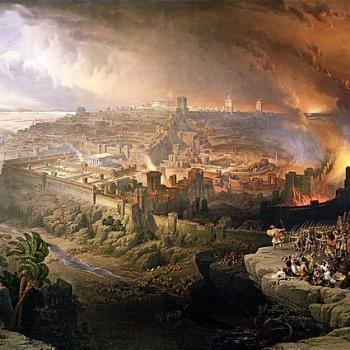
Wikimedia Commons public domain
I taught 1 Samuel 9-17 in my ward’s Gospel Doctrine class today.
Memorable stories.
The account given in 1 Samuel 15 in particular, though, is a very difficult one. The total annihilation of a people is painful to read about, particularly when the directive to do so is said to have come from God himself.
It’s an issue well worth discussing, but I don’t want to get too deeply into it right now. Suffice it to say that I’m not even sure that these military tales are entirely accurate, historically speaking, anyway. Could they have been exaggerated, in order to heighten the heroism of the founders, for example.
In any event, here’s how the chapter opens:
1 Samuel also said unto Saul, The Lord sent me to anoint thee to be king over his people, over Israel: now therefore hearken thou unto the voice of the words of the Lord.
2 Thus saith the Lord of hosts, I remember that which Amalek did to Israel, how he laid wait for him in the way, when he came up from Egypt.
3 Now go and smite Amalek, and utterly destroy all that they have, and spare them not; but slay both man and woman, infant and suckling, ox and sheep, camel and ass.
The Amalekites dwelt in the Negev Desert, far to the south of today’s Israel, just to the west of the southern end of the Dead Sea and around in the land of Moab (in modern-day southern Jordan).
Saul was disobedient to the divine commandment conveyed by Samuel:
7 And Saul smote the Amalekites from Havilah until thou comest to Shur, that is over against Egypt.
8 And he took Agag the king of the Amalekites alive, and utterly destroyed all the people with the edge of the sword.
9 But Saul and the people spared Agag, and the best of the sheep, and of the oxen, and of the fatlings, and the lambs, and all that was good, and would not utterly destroy them: but every thing that was vile and refuse, that they destroyed utterly.
10 ¶ Then came the word of the Lord unto Samuel, saying,
11 It repenteth me that I have set up Saul to be king: for he is turned back from following me, and hath not performed my commandments. And it grieved Samuel; and he cried unto the Lord all night.
12 And when Samuel rose early to meet Saul in the morning, it was told Samuel, saying, Saul came to Carmel, and, behold, he set him up a place, and is gone about, and passed on, and gone down to Gilgal.
13 And Samuel came to Saul: and Saul said unto him, Blessed be thou of the Lord: I have performed the commandment of the Lord.
14 And Samuel said, What meaneth then this bleating of the sheep in mine ears, and the lowing of the oxen which I hear?
15 And Saul said, They have brought them from the Amalekites: for the people spared the best of the sheep and of the oxen, to sacrifice unto the Lord thy God; and the rest we have utterly destroyed.
And plainly, in fact, more Amalekites than merely Agag survived. (See above, where I express some degree of uncertainty, anyway, as to whether this story is precisely accurate, historically.) Of the 613 commandments (mitzvot) enumerated in Orthodox Jewish writing, three refer to the Amalekites, who are obviously assumed still to exist. As set out by the great medieval rabbinic authority, physician, and philosopher Moses Maimonides, (d. AD 1204) those three mitzvot are:
- 598 Deut. 25:17 – Remember what Amalek did to the Israelites
- 599 Deut. 25:19 – Wipe out the descendants of Amalek
- 600 Deut. 25:19 – Never forget Amalek’s atrocities and ambush on our journey from Egypt in the desert
The rabbis derived these mitzvot from Deuteronomy 25:17–18, Exodus 17:14 and 1 Samuel 15:3. Rabbi Shlomo Itzhaki (d. AD 1105), who is better known by the acronym Rashi, indicates that the extermination must be total and complete, “from man unto woman, from infant unto suckling, from ox unto sheep, so that the name of Amalek not be mentioned even with reference to an animal by saying ‘This animal belonged to Amalek.'”
Pretty rough.
In any event, Saul’s failure to carry out the divine commandment resulted in God’s repudiation of him as king. (A previous episode of disobedience — described in 1 Samuel 13:5-14 — had already cost Saul’s posterity the right to succeed him on the throne of Israel.)
16 Then Samuel said unto Saul, Stay, and I will tell thee what the Lord hath said to me this night. And he said unto him, Say on.
17 And Samuel said, When thou wast little in thine own sight, wast thou not made the head of the tribes of Israel, and the Lord anointed thee king over Israel?
18 And the Lord sent thee on a journey, and said, Go and utterly destroy the sinners the Amalekites, and fight against them until they be consumed.
19 Wherefore then didst thou not obey the voice of the Lord, but didst fly upon the spoil, and didst evil in the sight of the Lord?
20 And Saul said unto Samuel, Yea, I have obeyed the voice of the Lord, and have gone the way which the Lordsent me, and have brought Agag the king of Amalek, and have utterly destroyed the Amalekites.
21 But the people took of the spoil, sheep and oxen, the chief of the things which should have been utterly destroyed, to sacrifice unto the Lord thy God in Gilgal.
22 And Samuel said, Hath the Lord as great delight in burnt offerings and sacrifices, as in obeying the voice of the Lord? Behold, to obey is better than sacrifice, and to hearken than the fat of rams.
23 For rebellion is as the sin of witchcraft, and stubbornness is as iniquity and idolatry. Because thou hast rejected the word of the Lord, he hath also rejected thee from being king.
24 ¶ And Saul said unto Samuel, I have sinned: for I have transgressed the commandment of the Lord, and thy words: because I feared the people, and obeyed their voice.
25 Now therefore, I pray thee, pardon my sin, and turn again with me, that I may worship the Lord.
26 And Samuel said unto Saul, I will not return with thee: for thou hast rejected the word of the Lord, and the Lordhath rejected thee from being king over Israel.
27 And as Samuel turned about to go away, he laid hold upon the skirt of his mantle, and it rent.
28 And Samuel said unto him, The Lord hath rent the kingdom of Israel from thee this day, and hath given it to a neighbour of thine, that is better than thou.
29 And also the Strength of Israel will not lie nor repent: for he is not a man, that he should repent. . . .
32 ¶ Then said Samuel, Bring ye hither to me Agag the king of the Amalekites. And Agag came unto him delicately. And Agag said, Surely the bitterness of death is past.
33 And Samuel said, As thy sword hath made women childless, so shall thy mother be childless among women. And Samuel hewed Agag in pieces before the Lord in Gilgal.
34 ¶ Then Samuel went to Ramah; and Saul went up to his house to Gibeah of Saul.
35 And Samuel came no more to see Saul until the day of his death: nevertheless Samuel mourned for Saul: and the Lord repented that he had made Saul king over Israel.
Bracketing the lethal violence against the Amalekites — I know, I know: it’s a pretty big thing to bracket — this remains a sad story. Saul is rather pathetic, and his life will become increasingly unfortunate until its tragic end. But Samuel, too, emerges as a pitiable figure in his grieving and mourning for Saul and his vain all-night entreaties to the Lord on Saul’s behalf.
But I’ll close by coming back, just briefly, to the subject of the Amalekite genocide (or quasi-genocide):
A friend in our Gospel Doctrine class today offered an interesting suggestion. I don’t pass it on as a total or wholly satisfying solution to the extreme violence of this story, but I do find it intriguing.
A total prohibition on taking slaves or booty from a war might actually, he proposes, have had something of a deterrent effect against wars. Why? Pre-modern armies were heavily modified by the prospect of plunder and gain. Slaves, concubines, jewels, weapons, produce, farm animals — there was much to be taken from an enemy if things went well. But if there were no possibility at all of any such plunder, many ancient and medieval soldiers and their leaders (and not a few still today) would have been considerably more reluctant to march out, putting their lives at great risk.
Just a thought.












